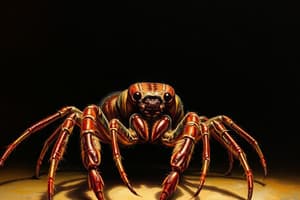Podcast
Questions and Answers
What characterizes the Phylum Arthropoda?
What characterizes the Phylum Arthropoda?
- Triploblastic; bilateral symmetry (correct)
- Radial symmetry
- Anatomically unsegmented
- Presence of a notochord
Which of the following is a feature of Chelicerata?
Which of the following is a feature of Chelicerata?
- Three pairs of walking legs
- A single pair of antennae
- Two body tagmata (correct)
- Presence of jaws
What are the main functions of gas exchange in Chelicerata?
What are the main functions of gas exchange in Chelicerata?
Tracheae, book lungs, or gills
Name the two anterior appendages in Chelicerata.
Name the two anterior appendages in Chelicerata.
What is the primary structure covering the prosoma in Class Merostomata?
What is the primary structure covering the prosoma in Class Merostomata?
What are book gills?
What are book gills?
What defines the telson in horseshoe crabs?
What defines the telson in horseshoe crabs?
What term describes the reduced appendages on the last segment of the prosoma in Merostomata?
What term describes the reduced appendages on the last segment of the prosoma in Merostomata?
What type of larva is found in Class Merostomata?
What type of larva is found in Class Merostomata?
Flashcards
Arthropoda characteristic
Arthropoda characteristic
Triploblastic; bilateral symmetry
Chelicerata feature
Chelicerata feature
Two body tagmata
Chelicerata gas exchange
Chelicerata gas exchange
Tracheae, book lungs, or gills
Chelicerata anterior appendages
Chelicerata anterior appendages
Signup and view all the flashcards
Merostomata prosoma covering
Merostomata prosoma covering
Signup and view all the flashcards
Book gills
Book gills
Signup and view all the flashcards
Horseshoe crab telson
Horseshoe crab telson
Signup and view all the flashcards
Merostomata reduced prosoma appendages
Merostomata reduced prosoma appendages
Signup and view all the flashcards
Merostomata larva type
Merostomata larva type
Signup and view all the flashcards
Study Notes
Phylum Arthropoda
- Comprises triploblastic organisms with bilateral symmetry.
- Exhibits tagmosis where body segments fuse to create tagmata.
- Possesses a chitinous exoskeleton, typically in plates known as sclerites.
- Undergoes ecdysis, a molting process for growth.
- Features jointed appendages for mobility and manipulation.
Physiological Features
- Utilizes various structures for gas exchange, including tracheae, book lungs, or gills.
- Conducts osmoregulation through nephridia in aquatic species and Malpighian tubules in terrestrial forms.
- Equipped with compound eyes for enhanced vision.
- Capable of open circulatory system, utilizing a hemocoel for nutrient distribution.
Subphylum: Chelicerata
- Body is structured into two tagmata: prosoma (anterior) and opisthosoma (posterior).
- First pair of appendages, chelicerae, is often modified for grasping or piercing food.
- Second pair, pedipalps, serves diverse functions including reproduction and predation.
- Contains four pairs of walking legs and lacks antennae, a primitive characteristic.
Class: Merostomata (Horseshoe Crab Anatomy)
- Dorsal side features a carapace, a protective chitinous covering over the prosoma.
- Telson acts as a tail spine for locomotion and stability.
Class: Merostomata (Ventral Side)
- Gill flaps cover book gills, which are leaf-like structures for gas exchange.
- Genital operculum located on the first opisthosomal segment, serving to cover the genital pore.
Class: Merostomata (Appendage Characteristics)
- All appendages possess chelate features (with pincers) and are equipped with gnathobases.
- Gnathobases serve as toothed structures at the base of appendages, facilitating food grinding.
Additional Features
- Chilaria are reduced, hairy appendages located on the last segment of the prosoma.
- Horseshoe crab larvae exhibit trilobite larval form, notable for its evolutionary significance.
Studying That Suits You
Use AI to generate personalized quizzes and flashcards to suit your learning preferences.




